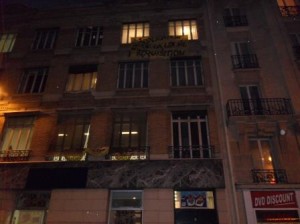Could France’s empty buildings ease its homeless crisis?
In a brazen move to help homeless families endure the cold winter, activists have taken over empty Paris office buildings and moved dozens of people in. Property-owners are alarmed. But the government’s response has been surprising.
From shelters to prime Paris real estate
In the big, bright green communal kitchen, Samia Lacombe wipes the counter clean and takes some of the soup that she’s made to her new neighbors down the hall.
She passes a playroom, where half a dozen children are chasing each other – a little girl brandishes a rubber boot at a larger, and suddenly wary boy. The tables have turned.
In a sharp shift of fortune, Ms. Lacombe and her new neighbours have swapped the streets and shelters for prime office space in the heart of Paris.
Listen to the CBC Radio Report on a Radical Solution for Homelessness:
Lacombe and her children are among the 60 homeless people to have moved into a four-floor office building inParis’s 10th arrondissement, a district ranging from upscale strips that line the canal, to older neighborhoods that are nevertheless out of reach for a growing number of families.
Skyrocketing property prices have helped create a nation-wide homelessness crisis, with an estimated 190,000 people sleeping in the streets, alleys, and subway platforms and drifting from shelter to shelter. According to the Abbé Pierre Foundation, a group that works with the poor and homeless, an additional 400,000 people stay with friends and family on couches and floors, while more than 3 million live in crowded accommodation.
Sitting idle alongside the homeless is a staggering number of empty buildings across the country. More than 2 million properties were vacant in 2012 – reason enough to begin occupying them, say NGOs like Droit Au Logement (Right to Housing) or DAL.
In a search for available space in Paris, housing rights Voot for iphone activists spotted a building not equipped with the sophisticated surveillance systems normally deployed on commercial property. Last month activists entered the building – how, DAL says it does not know – allowing workers to spirit Lacombe, her children, and 13 other families inside.
Not government-endorsed requisitions then, but what DAL spokesman Jean-Baptiste Eyraud calls “a citizens’ requisition” – a radical answer to the excesses of an unchecked housing market.
“Citizens Requisitions”
“Prices have doubled in 10 years, and rent has gone up by 50 percent,” says Mr. Eyraud. “The government simply doesn’t have the means to house the homeless with the existing housing stock on the market. So we have to start putting empty properties to use.”
But not every vacant building can be used in this way. Associate Professor Julien Damon at Sciences Po (Institute of Political Studies) says most such properties are far from city centers, or in a state of disrepair.
Even the 100,000 or so vacant properties that he believes are potential homes, he says should be left alone, because requisitions tend to scare away investors – just when an ailing French economy needs them most.
It’s a point echoed by Paul Philippot of the National Real Estate Union. Mr. Philippot deems DAL’s occupation illegal, and says state requisition of properties – such as those carried out under former President Jacques Chirac in the 1990s – is counter-productive. “It makes a few more properties available,” he says, “but the message being sent to property owners is, ‘if you don’t rent it out, we’ll take it from you!’ That’s a very bad signal to send.”
Not only has a message already been sent – the process has begun. The government has identified 120 vacant buildings in and around Paris, and is conducting “technical visits” to assess whether the properties are inhabitable.
Though owners will be offered compensation, it doesn’t bode well for absentee landlords who wish to wait for property values to soar even higher before they sell to the highest bidder.
‘We never feel at home’
The owners of the four-story building in the 10th arrondissement have not yet contacted DAL. Having been there a few weeks, the new occupants now have the right to remain until the courts have ordered their eviction. The legal process could take months.
But Samia Lacombe isn’t decorating the walls yet, either. She is all-too-accustomed to wandering the city in search of the next place to sleep for a family that has been “nomadic,” as she puts it, for five years. Her kids speak with business-like seriousness when assessing their new home, counting among the merits of the transformed offices the privacy and space to do their homework.
The 10-year-old bespectacled Alicia boasts with a lisp that she is at the top of her class, even though she has spent half her life living in dorms and shelters.
Her brother Henry, 17, is relieved that they can call the three-room converted apartment “home” for months, instead of weeks or days. In a nightly effort to escape the normally crowded quarters, he would do his homework on his lap in a cramped washroom. “We never feel at home,” says Henry. “We’re always uneasy. We know we can be thrown out from one day to the next.”
Their lives have been transformed more than once. Until five years ago, the family lived in a spacious flat near the canal before their luck ran out. Having separated from her husband, Lacombe could not go on paying the €3,800 ($5,100) per month rent on her salary working at a temp agency. After six months of unpaid rent, they were evicted, and have been homeless ever since.
They were whisked into their new home last month just before temperatures plunged. It’s during the cold winter months that the death toll of people living in the street begins to climb.
A deepening crisis
The situation has become so desperate, that the housing minister, Cécile Duflot, recently called on churches to open up their doors to accommodate more people.
Shelters are overwhelmed. Between 2005 and 2011, calls to the winter emergency shelter service have almost doubled. Only 12 percent of callers are directed to some kind of shelter; the rest are told to try again.
It’s likely to get worse before it gets better. France’s unemployment rate rose in December for the 20th consecutive month. More than 1 million people are in rent arrears – and the economic forecast for 2013 is grim.
While French law dictates that everyone has the right to a home, there is simply not enough social housing or shelters to keep up with soaring demand.
Ms. Duflot has committed to the construction of 500,000 accommodations in 2013 – almost double the total built last year. One third is to be social housing – an ambitious goal that even she admits will be difficult to meet.
This is what DAL and a number of groups working with the homeless have been campaigning for. Few consider requisitions a panacea – DAL works with 10,000 families to secure better housing conditions, legal advice, and long-term shelter.
But it also believes that occupying vacant properties will at least expand a limited stock of affordable housing, however modestly.
Urging the minister to press on with the requisitions she promised last month, Eyraud and his DAL colleagues recently sent her a reminder in the form of a gift.
It was a crowbar.
“A bit of humor,” he says with a smile.



